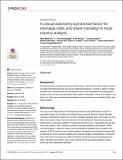Is Sexual Autonomy a Protective Factor for Neonatal, Child, and Infant Mortality? A Multi-country Analysis
View/
Publication Date
2/22/2019Type
Article, Journalviews
downloads
Metadata
Show full item recordCitation
Memiah P, Opanga Y, Bond T, Cook C, Mwangi M, Fried J, et al. (2019) Is sexual autonomy a protective factor for neonatal, child, and infant mortality? A multi-country analysis. PLoS ONE 14(2): e0212413. https://doi.org/10.1371/journal.pone.0212413
Abstract/
Background Sexual autonomy empowers women to set boundaries, take control of their bodies, prevent sexually transmitted diseases and avoid unplanned pregnancy. A woman’s ability to negotiate safer sex is crucial for her survival and that of her child. Sexual autonomy among East African women is vital to the elimination of the deaths of neonates, infants, and children. The aim of our study was to explore the association of sexual autonomy on neonatal, infant, and child mortality. Methodology This was a secondary analysis of demographic health survey (DHS) data on women of reproductive age (15–49 years) in five East African countries: Burundi, Kenya, Rwanda, Tanzania, and Uganda. Data on our outcome variables neonatal, infant, and under-five mortality which were in binary form was extracted from the database. Sexual autonomy was classified as a composite variable of “respondent can refuse sex,” “respondent can ask partner to use condom,” and “if spouse is justified in asking husband to use condom.” Other sociodemographic, maternal, health system and paternal variables were included in the analysis. STATA version 14 was used for analysis. Proportions and frequencies were used to describe the three outcome variables and sociodemographic characteristics. Chi-square tests were used to compare associations between sexual autonomy and categorical variables. Adjusted hazard ratios were used to determine the association between sexual autonomy and independent variables. Results The sampled women were predominantly urban (75%; n = 5758) and poor (48.7%; n = 3702). A majority of those that experienced mortality (neonatal mortality 53.5%, infant mortality 54.3%, under-five mortality 55.7%) were young (under 20) at the time of their first child’s birth while their male partners were older. The multivariate analysis supports the beneficial effects of women’s sexual autonomy in East Africa. Women who exercised sexual autonomy experienced significantly lower rates of child mortality at all three stages: neonatal (NHR = 0.80, 95% CI: 0.68–0.94, p = 0.006), infant (IHR = 0.82, 95% CI: 0.72–0.93, p = 0.003), and under-five (UHR = 0.84, 95% CI: 0.75–0.94, p = 0.002), net of all other factors. Receiving antenatal care and using contraceptives also contributed significantly to lower child mortality rates. Conclusion Our findings suggest that sexual autonomy among East African women is an urgent priority that is crucial to the survival of neonates, infants, and children in East Africa. Women should be informed, empowered, and autonomous concerning their reproductive and sexual health.
Subject/
Sexual autonomy; sexually transmitted diseases; neonatal; infant; child; mortality; East Africa
Further Details
This is an open access article, free of all copyright, and may be freely reproduced, distributed, transmitted, modified, built upon, or otherwise used by anyone for any lawful purpose. The work is made available under the Creative Commons CC0 public domain dedication.
Publisher
Plos OneCollections
- General - GEN [367]

